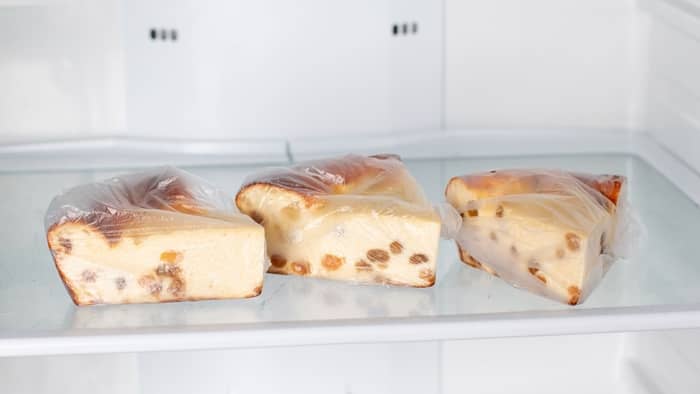By Lindy Van Schalkwyk, last updated on October 3, 2024
The shelf life of cheesecake is affected by many factors. Today, we’ll guide you through everything you need to know, including how to extend it!
What Is “Shelf Life”?
We have all heard the words “shelf life” being used all too often. But, what does it mean? You probably figured it has something to do with the expiry date of an item, but which date? Is it the best-by date, the sell-by date, or the actual now-it’s-unusable-date?
Shelf life is the term widely used to describe how long a food item remains safe for consumption. This exact date can refer to all three of the above-mentioned descriptions.
When people (ourselves included) refer to the shelf life of an item, we specifically talk about the amount of time before the item becomes physically unsafe to be eaten. Not necessarily the date at which it won’t be appealing anymore.
The sell-by date refers to the date the grocery store or shop should sell the item. This is usually a couple of days before the item will start becoming unappealing, flavorless, or unattractive. But, the item is still edible.
The best-by date refers to the date at which the product has lost its appeal. While it is still edible after this date, it won’t be as good as the manufacturer intended it to be.
And finally, the exact expiration date isn’t often used because many factors will influence this. But, some products do have this date printed on them.
Shelf Life Of Cheesecake – Is It Long?

The shelf life of cheesecake is much longer than other cakes! So yes, we can actually say compared to certain other cakes that cheesecake does have a relatively long shelf life.
Regular cakes dry out and lose their quality a lot faster than cheesecakes do. However, the shelf life of cheesecakes can also instantly and drastically be affected depending on how the cheesecake is being stored! Proper storage is the key to the longest possible shelf life of cheesecake.
The average shelf life of cheesecake bought from the store can range between 5 to 7 days. Homemade cheesecakes do tend to have a shorter shelf life because they don’t contain as many additives and preservatives.
And of course, frozen cheesecake will last the longest of them all, about 2-3 months (possibly longer). But, as with most baked items, the freezing process will also alter the texture and flavor of the cheesecake. So take that into consideration before freezing your cake.
How Long Will Cheesecake Last In The Fridge?
The shelf life of cheesecake is longest when the cheesecake is properly stored in the fridge. Cheesecake contains highly perishable ingredients like eggs, cream cheese, and often other dairy products. All of these can cause serious illnesses if they are not stored correctly, especially in hot conditions!
So, make sure to keep your cheesecake in the fridge to prolong not only the shelf life but also make it safe for consumption! What’s the old saying? Better safe than sorry!
When stored in an airtight container in the fridge, your cheesecake can last up to a week. But, unbaked cheesecakes will only last about 3 days.
How long does cheesecake last at room temperature?
We’ve all been there! You took the cheesecake out of the fridge for a while and then completely forgot to put it back! Now what? Well, while it’s always best to rather not take risks and keep your cheesecake in the fridge, accidents do happen.
The exact shelf life depends on the climate and weather conditions. On a cold day, the perishable ingredients aren’t as susceptible as on a hot day. Furthermore, any drafts around the cheesecake will have an influence on drying it out. Even the humidity levels will alter the texture and flavor.
Cheesecakes should rather not be kept out of the fridge for longer than 6 hours. But, it will probably be fine outside for about a day.
How To Properly Store Cheesecake?
As we have mentioned, cheesecake should always be stored in the fridge, regardless of it being a baked or unbaked version.
Furthermore, you should try and store it inside of an airtight container or cake box. If you have neither of these, you can always gently wrap the cheesecake with plastic or saran wrap.

Which Cheesecake Has The Longest Shelf Life?
Now, while all cheesecakes are perishable and don’t have an extremely long shelf life, some are still better long-lasting options than others.
As an example, store-bought cheesecakes will last longer than homemade or even box-made cheesecakes. This is because, as we have mentioned before, these cheesecakes have added preservatives and stabilizers. These chemicals help make the cheesecake last for at least a week from when it has been baked.
Furthermore, baked cheesecakes will always last longer than unbaked cheesecakes. This is due to the structural form of the ingredients. For example, when dairy products are baked with eggs, it increases their shelf life and makes them more stable. Unfortunately, unbaked products are now exposed to the elements and haven’t been changed to make them stable.
Cheesecake toppings also play a big role in how long the cheesecake lasts! Sometimes it’s better to store the toppings separately if you are making the cheesecake at home. Fresh cut fruits will go off before the cheesecake does and will introduce bacteria to its surface.
But, toppings like glazes and frostings (which cover the entire cake) may actually help extend the shelf life It can potentially act as a barrier between the internal structure of the cake and outside elements.
Shelf Life Of Cheesecake – Final Words
The shelf life of cheesecake is relatively long. But let’s face it, cheesecake is way too good that it will even last that long! We know that we usually finish one within a day or two – if we are so lucky!
If you enjoyed this article, be sure to keep checking out some of our other educational posts which we release weekly!
FAQs

Lindy Van Schalkwyk is a culinary specialist with a background in Advanced Cooking, Advanced Pâtisserie, Media Communications and Nutrition. She has gained invaluable experience in the culinary industry having worked in some of the top restaurants in Africa in 2016 and 2017. Her expertise in nutrition has enabled her to develop recipes for special dietary needs. In 2018, Lindy began working in the Food Media industry, focusing on recipe development, recipe writing, food writing and food styling.

